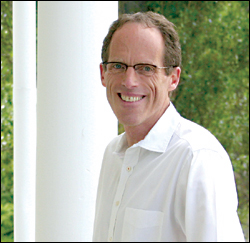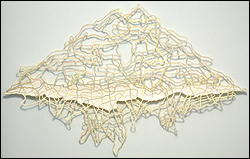Centrum, that venerable sponsor of a huge array of arts events including Jazz Port Townsend, the Port Townsend Writers’ Conference, and the Port Townsend Blues and Heritage Festival, is undergoing some significant changes.
But not everyone connected with the nonprofit organization is happy about what’s going on.
Thirty years after Centrum’s founding, Executive Director Thatcher Bailey is shaking up two of its most prominent events: the jazz festival and the writers’ conference.
Bailey, a well-respected organizer, fund-raiser, and arts patron, was chosen as Centrum’s interim director in November 2003 following Carol Schiffman’s retirement. He was subsequently hired as permanent director in February 2004. Bailey is well known for founding the Seattle HIV hospice Bailey-Boushay House, as well as his leadership in such projects as Artist Trust, Bay Press, Copper Canyon Press, and the Pride Foundation.
But two firings this summer have raised some public questions about Bailey’s shiny image. In June, Bailey fired Bud Shank, a world-class saxophonist and longtime artistic director of Jazz Port Townsend, just over a month before the festival was scheduled to begin on July 29. Shank told The Seattle Times he was furious at the way the firing was handled and vowed to start a competing workshop and festival, saying, “Is it get-even time? Yes.”
Also asked to resign was Sam Hamill, artistic director of the Port Townsend Writers’ Conference since 1996 and a poet and activist who has been closely linked to the festival since its founding in 1974. Reached at the offices of Copper Canyon Press, of which he’s a co-founder and chief editor, Hamill said, “Thatcher dropped this little bomb two weeks before the conference started and thought it would all be hunky-dory.” He has refused to have anything to do with the conference, which opened last week, adding, “I won’t lift a finger to do anything for Thatcher.”
In fact, the rift between Hamill and Bailey goes back further, to when Bailey served as publisher at Copper Canyon Press between 1998 and 2002. Those were years of conflict and turmoil for the nonprofit press, though it appears to have emerged from the period in better financial shape.
“These were tough decisions that were very carefully considered,” Bailey told me about the Centrum firings. “And tough decisions are risky.” Throughout our interview, Bailey talked of leading Centrum through an exciting period of “change and growth.”
“Thatcher talks a lot about change and growth,” Hamill told me. “And that change and growth nearly destroyed Copper Canyon.”
Bailey attended the exclusive Lakeside School a year ahead of Bill Gates and one behind Paul Allen. He’s the son of Philip Bailey, who made his fortune with the Olympic Stain paint company and who also served as publisher of the now-defunct Seattle newspaper Argus. Thatcher’s sister Barbara was founder and owner of Seattle’s Bailey-Coy books.
Early on, Thatcher Bailey became an important player in the state’s arts and nonprofit communities. In fact, his hiring at Centrum marks a return of sorts—his first job out of college was with Centrum, where he worked with the organization’s founder, Joe Wheeler.
Bailey is best known for the HIV hospice that bears his name and that of his lifelong partner Frank Boushay, who died of complications from the virus in 1989. Bailey was instrumental in securing hundreds of thousands of dollars to open Bailey-Boushay House in 1988, a renowned model for facilities that provide care for HIV patients.
He was also a founder of Bay Press, a widely respected publisher of literary theory and postmodern criticism. Bailey sold his stake in the press in 1993. He’s been instrumental in other nonprofit organizations as well. “He’s a famously good fund-raiser,” admitted Hamill. “He’s amiable, bright, and energetic.”
Nonetheless, he and the famously irascible Hamill butted heads repeatedly during Bailey’s stint as publisher of Copper Canyon. Hamill—a pugnacious former Marine turned pacifist, Zen Buddhist, poet, and translator of ancient Chinese and Asian texts—is perhaps best known as an instigator behind Poets Against the War, an organization opposing the Iraq War. He’s also a co-founder of Copper Canyon, which he moved to Port Townsend in 1974 as a press in residence with Centrum.
Hamill claims that during Bailey’s time at the press, Bailey gave speeches on “how he didn’t believe in hierarchy,” and then proceeded to try to force out Hamill and change the editorial direction of the press. The fight was bitter, and in the end, it was Bailey who left Copper Canyon.
Of his time at Copper Canyon, Bailey would only say, “I feel very good about those four years—as good as I could. I’ll let Sam speak for himself.”
Regarding his departure from the writers’ conference, Hamill told me he was more than willing to step down after six years of leading the conference and had informed Bailey of this. “Thatcher could have sat down with me and had none of this turmoil,” said Hamill. Instead, after Hamill e-mailed Bailey in March 2004 about his intention to step aside, the poet heard nothing from Bailey until he received a letter asking him to step down in June.
For his part, Bailey suggested there were good reasons for the timing of the firings, but wouldn’t elaborate. Bailey was also hesitant to criticize programming at either the jazz festival or the writers’ conference, saying only “there’s a perception they’re just doing the same things all over again. It’s not to say we’re going to have better programming, but different programming.”
Bailey’s plan includes an extensive series of interviews with artists, audience members, volunteers, and Centrum supporters. There’s talk of limiting terms for the newly renamed “creative directors” for each of the festivals to three to five years. “We don’t want a program identified with a particular person,” said Bailey, “but instead with change, creativity, and risk taking.”
He hasn’t hinted at whom he might hire to replace Hamill and Shank, but the choices will be crucial. Festivals like these need artistic directors with strong tastes and passionate artistic vision—qualities that don’t always make someone easy to get along with.
The Port Townsend writers’ conference attracts between 125 and 150 participants each year, and features a faculty of nine or 10 authors. The conference also hosts a series of readings by noted Northwest authors. This year’s lineup included, among others, poet Emily Warn, author Craig Lesley, and UW professor and poet Linda Bierds.
“Whoever leads this will be taking over a very healthy conference,” said Hamill. Bierds says her students have been incredibly enthusiastic over the years, with some signing up year after year.
But there did tend to be a circle of poets and writers close to Hamill who showed up on the program with regularity (which parallels a criticism some have made regarding Shank and the jazz festival). According to current Centrum board member and past president David Marriott, “It would be easy for me to say it was getting a little tired. But that’s not a criticism of Sam. Maybe we can tweak it here and there.”
Finances for the writers’ festival and for Centrum as a whole don’t appear to have driven the recent changes. Founded in 1973 as a joint project of Washington State Parks, the Office of the Superintendent for Public Instruction, and the Washington state Arts Commission, Centrum currently receives about 15 percent of its budget from the OSPI and the arts commission (state parks, though it provides facilities, no longer provides direct funding to Centrum). Another 20 percent of Centrum’s budget comes from donations from individuals, businesses, and foundations. The remaining 65 percent comes from ticket and event revenue.
So, clearly, programming choices and artistic direction are crucial to Centrum’s future.
In early 2003, there was talk in the state Legislature of substantially cutting the $230,000 Centrum annually receives from the state. In response, Centrum temporarily slashed payroll (although it didn’t lose any staff) and was extremely conservative in its spending.
The threatened budget cuts never materialized, and by the end of 2003 Centrum had a $110,000 surplus. “I think what convinced the lawmakers,” said Bailey, “was that ultimately we return more to the state than we take in.”
In addition to a variety of arts festivals and conferences, Centrum funds the largest artist-in-residence program in the Pacific Northwest, sponsoring between 50 and 100 artists from multiple disciplines and nations each year at its Fort Worden campus. The organization’s arts and education program for middle- and high-school students is another strong point—many who came to camps and classes here in their teens have returned to other events in adulthood.
The question remains: Is the flap over the two firings simply a minor incident—a case of clashing personalities—or is it a hint of future stumbles for Centrum?
Board member David Marriott, who has been with Centrum for 20 years, is convinced the organization has found the right person to lead it through a tough economic time. “Thatcher has always impressed me as someone who has great vision,” said Marriott. “He’s brought a positive, inspirational energy to this organization I haven’t seen in years.”
For Hamill, Bailey’s style—heavy on visioning and lean on specifics—is maddening. “The ancient Chinese had a word for it: shou jen, or empty words.”
Bailey dismisses personality conflict as an issue, and insists that the point is what Centrum’s programs do for people. “Story after story I heard while talking to people involved with Centrum kept coming back to ‘It changed my life,'” said Bailey. “I kept hearing it over and over. And our new mission statement reflects that: We promote creative experiences that change lives.”








